Schlagwort: ‘Elektrotechnik’
My experiences in Sweden
- Electrical Engineering M.Sc.
- Sweden, Linköping
- Ionautics AB
- 02/2022 – 06/2022
In the following I will report about my internship abroad with Erasmus+ in Sweden, which I conducted in the 4th semester of my Master’s studies in Electrical Engineering.
Preparation and search for an internship
Before I started my internship, I already did an Erasmus study semester in Stockholm at the KTH. Therefore, my start in the internship was probably very
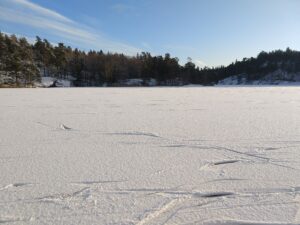
© Max Renner
different to most other people who come directly from their home country, because I was living in Stockholm already since August 2021. My studies ended in January 2022. However, I wanted to stay longer than half a year and for that an internship was the perfect possibility, since it is a mandatory part of my Master’s studies anyway. So, in January, shortly before the Erasmus studies ended, I began looking for an internship. Very important to know about internships in Sweden is that they normally do not exist in the form they do in Germany. Most companies only offer Master’s thesis opportunities and internships only during the summer months in a fixed context. Internships in the normal working schedule as they are usual in Germany are rare. I also sent a couple of speculative applications to companies, but the feedback was very sparse. In the end I managed to find an internship by contacting my professors from KTH, one of whom referred me to a professor who held a guest lecture in that course. He had a project in mind which was suitable for an internship and so it worked out in the end. In conclusion, it might be hard to find an internship in Sweden (apart from Master’s theses) outside the summer months. It might still be worth trying, but without personal connections it will probably be a bit harder than in Germany to find a fitting spot.
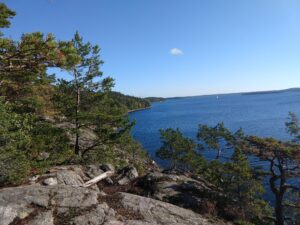
© Max Renner
Formalities
The formalities were very conveniently fulfilled. From the company’s side, I at some point got a working contract and once it was signed everything was practically done. It all worked out even without the personal number, which usually is needed in Sweden for pretty much everything. But it is only possible to obtain it if one stays at least a full year. But still, formalities and payment were no issue even without the number, at least in my case. The Erasmus+ paperwork was also very easily done. I got a list of what I should hand in, and after I took care of that I already got the Erasmus funding pretty quickly. Regarding the health insurance, I relied on the European Health Insurance Card which I had by being health-insured in Germany. For getting the covid vaccine in Sweden it worked out, otherwise I luckily did not have to use it. I still had my apartment in Stockholm from my previous Erasmus semester, so I did not have to look for a new one. However, it was not very good and extremely expensive (800€ per month – only possible thanks to the Erasmus funding). Apartments in Stockholm are very hard to find, especially as a non-student, so I kept my apartment even though it was so expensive. I found it on blocket.se, but lots of other apartments are also rented out on Facebook. Students in Stockholm also have access to SSSB student housing, which is probably the best and cheapest option, but as an intern who is not also studying at a university in Stockholm that is not possible as far as I know. (The rents in Stockholm are capped by law. Two Swedish friends said my rent would surely be too high and that I could claim part of the money easily back. I will try that, but since the process is not yet finished, I can not say whether or how good this works.)
Job and everyday life
The internship was supervised by a guest professor from one of my courses, as already mentioned. I worked for Ionautics AB, and the internship was done in cooperation with the Linköping University. I conducted experimental work in the area of High Power Impulse Magnetron Sputtering, a technique for deposition of thin films. Since the main purpose of my internship was research, we are now, after the internship is done, working on a manuscript to publish the results as a scientific paper. The internship was in Linköping, however I
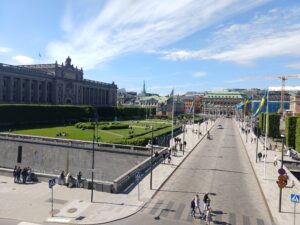
© Max Renner
decided to keep living in Stockholm, since all my friends from the previous Erasmus semester were there as well and because Stockholm is a beautiful city. This on the other hand side made it necessary to commute a couple of times a week, which was extremely exhausting, since it took 2.5h per way. I did home office two or three times a week and could also work during the train rides, otherwise it would not have been possible to keep living in Stockholm. Still, the commuting was very annoying and took a lot of time, so I would not recommend it if there is no concrete reason to do it. The job routine was not too different from Germany, so I did not have something like a culture shock. My working time was the usual 40h per week. Due to the commuting, I had a lot of flexibility for the working hours and the home office, that was very nice. Important to notice about most companies in Sweden is that in the summer, especially July, practically no one is working. Many companies completely close for three weeks or so in July, and those who do not have most of their employees on vacation anyway. My internship ended in June, so I was not directly affected by that, but people who want to work over the whole summer should be prepared that it might be necessary to take a couple of weeks off in July.
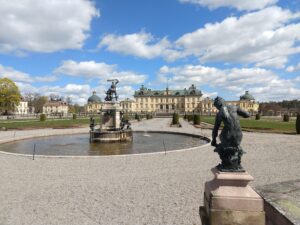
© Max Renner
Leisure
My colleagues were all extremely nice and friendly, I really enjoyed my working environment. However, due to the long distance from home, the people I met after work were my study friends from KTH rather than my working colleagues. In that sense, my leisure time was a bit atypical for an intern, since I was still a part of the Stockholm international student bubble. Stockholm is an extremely beautiful city and there is a lot to do. I was on the road for practically one year non-stop and still had a couple of ideas about what to see and do. With sightseeing, bar hopping and outdoor activities there is easily enough to do for a whole year in Stockholm. I would also recommend doing some trips to the other parts of Sweden. The darkness in the winter can be an issue for some, the best remedy is to do a lot of activities and meet many friends, then it is not a big deal anymore (at least for me). And in the summer you get the reward with long nights, beautiful sunsets and the midsommar celebrations! I did not really have something like a typical everyday life, because the commute was very long and I was travelling a lot as well. That means I was also not part of a sport club or something. However, I was still part of the KTH Outdoor Club, for which you do not need to study at KTH. So for outdoor lovers in Stockholm I can recommend to check that out.
Conclusion
All in all, the internship was an incredibly enriching and interesting experience. For anyone who gets the opportunity to work in Sweden for some time, I would definitely recommend taking the chance. The only drawbacks are the high prices and that it might be hard to find an internship spot. But if you worked that out, you will be rewarded with nice people, interesting work experiences, a beautiful nature and long summer nights!
Creating countless memories in Dublin, Ireland
- Electrical Engineering and Information Technology, PhD
- Dublin, Ireland
- University College Dublin
- 01.09.20221 – 28.02.2022
Preparation/Internship Search:
Since my early bachelor’s days, the prospect of studying abroad has been tempting and fascinating to me. However, during my undergraduate, I couldn’t find the right time to study abroad. With the start of my PhD at RWTH Aachen University, I approached my professor with the idea of a research visit. He liked the idea and initially suggested a research visit in the latter half of 2020. With the COVID-19 pandemic eventually bringing everything to a stand-still, we postponed further preparation to early 2021. Despite the still ongoing COVID-19 pandemic, we went on with my professor getting in touch with a colleague of his at University College Dublin who works on similar topics as my chair back at RWTH Aachen University. The professor at University College Dublin was quickly convinced of such a research visit, mutually benefiting both institutions with the prospect of closer collaboration and exchange in the future. The general timeline was set from this point in time, and we entered the second stage of planning my visit. Luckily my stay as a visiting researcher was independent of any undergraduate curricular or requirements (e.g., proof of English, certain average GPA, etc.). Thus, the only thing that University College Dublin required was to fill out one form to register as a visiting researcher officially and have these documents signed by my professor. As such, any kind of tuition fees, which are common to be paid at Irish universities, were waived. At RWTH Aachen University, a little bit more preparation was involved. Firstly, we had to officially apply for a leave from my duties as a scientific assistant. Secondly, we contacted the International Office and prepared all documents for the ERASMUS+ Internship application. Closer to the start of the research visit, I was eventually able to register myself with University College Dublin. The process itself was very smooth and didn’t take much time.
Apartment search in Dublin:
Being used to the “cheap” cost of living in Germany, searching for apartments in Dublin might come as a shock. The average price for renting is much higher than in Germany (typically two to three times higher for a shared living), with landlords typically renting for one year or more. In the case of private dorms renting is based on a trimester basis (meaning only for four or eight months). Hence, finding a cheap place for just half a year is quite challenging. Despite University College Dublin offering a housing program, the prices rank on the same level as renting from private landlords/companies. Furthermore, due to my somewhat late application, I could not get a place in the housing program at University College Dublin. Eventually, I settled with a mixed approach, living in an expensive private dorm for the first four months in the city center before moving in with a few colleagues for the last two months close to University College Dublin. Usually, it is required to pay the whole renting sum (>several thousand) in a student dorm before moving in as monthly payment rates are only offered for long-term rents.
Commuting/Travelling in or around Dublin:
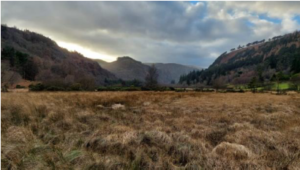
© Alexander Meyer
Transportation in and around Dublin is mainly limited to bus service only. There exist two metro lines called the Luas, respectively the green and the red line serving some parts of the city. Nonetheless, typically buses are the go-to option. To commute to University College Dublin, only buses are available with frequent schedules along the major routes. Especially during the morning and the evening, delays and disruptions in the rush hours are to be expected as most traffic is funneled through the highly congested city center. The Google Maps app proved to be the most reliable for accurate prediction of bus arrival times. Worth mentioning is the leap card used for all transportation in Ireland, as typically only a leap card is accepted as a form of payment. These can be bought at many shops and charged via NFC using an app on your smartphone. Additionally, students are entitled to get a Student Leap Card, offering lower fares for daily commuting. Nonetheless, even the reduced student fares for transportation/commuting to and from university/somewhere are much higher than in Germany. Besides public transport, many taxis exist that can be conveniently called and paid using the FreeNow app. Typically, taxis can be called via the app in less than five minutes, even outside the city center. Also, taxi rates are fixed and much lower compared to Germany, making it a favorable option, especially late at night. However, during the closing hours of bars and pubs during the weekend, getting a taxi can be tricky with the FreeNow app malfunctioning or taxi drivers picking up people on the street directly without relying on the app.
Daily Life:
Daily life in Dublin is not much different from any major city in Germany. Shopping for groceries/daily necessities is very convenient with various supermarkets/local shops such as Lidl, Aldi, Tesco, SuperValu, Centra, or Spar, to name a few, to be found everywhere in Dublin. Prices are not much different from Germany and can be generally categorized on the same level. Only ordering products online might take more days for delivery as most are brought in via the United Kingdom or France. Also, ordering food from all cuisines is very convenient, with a large variety to choose from with prices typically lower than dining in restaurants.
Health Insurance/Telephone/Banking:
My health insurance covered me during my visit at no extra cost. With the newly introduced regulations on roaming charges for mobile carriers by the European Union, I simply continued using my existing contract. However, with extra costs imposed on regular phone calls, I generally placed calls via Whatsapp or FaceTime to avoid being charged extra. Finally, I also continued using my bank account at no extra charges for banking. Contrary to Germany, a debit/visa card is typically accepted, so there is no need to carry cash in Ireland. To transfer money between friends, generally, Revolut or Paypal are the preferred go-to-apps.
Research:
During early talks with my professor/supervisor at University College Dublin, we had only agreed on a general outline for the research visit. Upon starting my research here at University College Dublin, I was offered various opportunities to work on exciting projects within the scope of the initial agreement. As there was no mandatory coursework to complete, I could solely focus on research, enjoying a high degree of autonomy and freedom. Whereas my work was primarily focused on simulation and developing models, now and then, measurements in the lab needed to be conducted. Also, publication and revision of the latest results were a significant part of my work, where I could benefit from the extensive knowledge existing in the group already. To keep in touch with my supervisors, there was a group meeting held every week in which the latest results/news about the chair and each PhD’s work were discussed, and a short report was submitted to the professor. Additional meetings were held whenever necessary. At University College Dublin, I had my own cubicle space, sharing a large office with all my fellow PhDs in the same group. There I was provided with all the resources required to conduct my research. Additionally, due to the open workspace culture, it was straightforward to get in touch with my colleagues and make new friends at work. With PhDs joining from across the globe, the group was very international, with people of various backgrounds, cultures, and an open-minded orientation. Consequently, besides working together on inspiring projects, we bonded over various social events on the weekends.
Leisure in Dublin:
With some restrictions on pubs and restaurants eased at the beginning of my stay, I got a chance to enjoy Dublin’s extensive pub and restaurant culture. Wherever you wander in Dublin, one can be sure to find a cozy place offering a pint of Guinness or some proper, triple-distilled Irish whiskey and some Irish band playing traditional music in the background. Generally, pubs and bars close around 2 am to 3 am, so somewhat earlier compared to Germany with bookings for large groups required for most places partly due to the COVID-19 restrictions that were in place. Nonetheless, the nightlife in Dublin is truly unique, where countless memories have been made. Besides the high congestion of pubs, bars, and restaurants, Dublin offers many places to visit. Among these, the most touristic ones are the Guinness Store House, telling you the origin story of Ireland’s most famous beer while enjoying an incredible view across Dublin in the rooftop bar. Or the many distilleries that offer tours and tastings such as the Teeling, Jameson, or Roe & Co distillery. Also, from a cultural point of view, Dublin has many theaters, museums, or galleries to offer. Being the capital of the Republic of Ireland, also many government buildings can be found throughout the city.
Exploring Ireland:
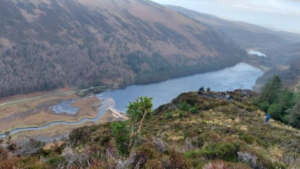
© Alexander Meyer
Besides working on my research during the weekdays, I tried to travel across Ireland/Dublin as much as possible. These travels were attainable despite the ongoing restrictions due to the COVID-19 pandemic, which were eventually lifted entirely to the end of my research visit. During these trips, I encountered a beautiful country with very friendly people along the way. Around Dublin, countless opportunities for hikes exist, which can be easily reached using public transport. Various trips lead me to Howth, Bull Island, or Phoenix Park in the north of Dublin or Dun Laoghaire, Killiney, Bray, or Greystones in the south of Dublin. All beautiful places which can be easily explored during on a day trip accompanied by many lovely restaurants and cafés at every spot. The most beautiful spot I encountered during my travels was the hike in the Glendalough Mountains in Dublin’s neighboring Wicklow County. Located in a natural reserve, one can truly experience and appreciate Ireland’s nature. Furthermore, trips to, e.g., Galway, Limerick, or Cork are highly recommended and can be easily reached using Irish Rail.
Conclusion:
Summing up, I genuinely enjoyed my time in Ireland. While working on exciting projects during the weekdays, the weekends were left for many exciting activities, and I enjoyed plenty of nights wandering Dublin’s nightlife with friends. Throughout my stay, I have made many new friends from across the globe, both at work and in my student dorm. Despite the high cost of rents, I would highly recommend staying at shared living at one of the plenty dorms, at least at the beginning, simply to meet many new people from all over the world. New friendships have been made, which I hope will last a lifetime. The Irish are very friendly people surrounded by a beautiful landscape that invites for countless hikes and trips in the greater Dublin area or beyond.

